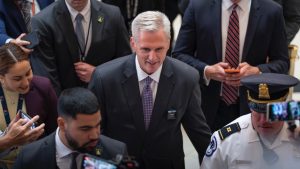After months of back-and-forth, fits and bursts of negotiations, high-profile meetings and trading barbs in the press, the House of Representatives is set to vote Wednesday on a bill brokered between President Joe Biden and Speaker Kevin McCarthy to raise the debt limit and impose some spending caps.
Should the measure pass the House, it will head to the Senate before it can make it to President Joe Biden’s desk to be signed into law. And with just days before a June 5 default deadline – the date that Treasury Secretary Janet Yellen says her agency will no longer be able to cover the country’s bills – time is of the essence.
“I cannot stress enough that we have no margin, no margin for error,” Senate Majority Leader Chuck Schumer, D-N.Y., warned on the Senate floor on Wednesday. “Either we proceed quickly and send this bipartisan agreement to the president’s desk or the federal government will default for the first time ever.”
“Any needless delay, any last-minute brinkmanship at this point would be an unacceptable risk,” the New York Democrat said. “Moving quickly, working together to avoid default is the responsible and necessary thing to do.”
Potentially impacting the timing of the bill’s passage is severe backlash from conservatives – members of McCarthy’s own narrow Republican House majority – who feel that the compromise falls short of the spending cuts they initially demanded, as well as from some progressive lawmakers who have expressed concerns about new work requirements for the federal food aid benefit known as the Supplemental Nutrition Assistance Program (SNAP).
Nearly three dozen Republicans have publicly come out against the 99-page bill, which suspends the debt limit for two years in exchange for two years of spending caps and other provisions, including clawing back some COVID-19 funds and clearing the way for a controversial pipeline in West Virginia backed by Sen. Joe Manchin, but opposed by many of his Democratic colleagues.
“This deal fails, fails completely,” said Pennsylvania Rep. Scott Perry, the chair of the far-right House Freedom Caucus, at a press conference Tuesday. “We will do everything in our power to stop it.”
“Not one Republican should vote for this deal, it is a bad deal,” said Texas Rep. Chip Roy, adding, somewhat ominously: “There’s going to be a reckoning.”
One House Republican lawmaker, North Carolina Rep. Dan Bishop, publicly backed ousting McCarthy over the deal.
“It is inescapable to me,” Bishop said Tuesday. “It has to be done.”
Despite the Republican backlash, the bill narrowly cleared a procedural hurdle Tuesday night, advancing past the House Rules Committee in a 7-6 vote to send the measure to the full House for a vote Wednesday. McCarthy, who worked late into the night Tuesday and again Wednesday to secure the necessary support on the bill from his conference, expressed confidence that they would have the votes to pass the bill.
“I’m confident we’ll pass the bill,” the California Republican told reporters Tuesday.
On Wednesday, McCarthy told reporters that he was “not at all” worried about challenges to his speakership, calling the bill “the first step to change the way we spend money.”
“To govern is not easy. I don’t want to be on the wrong side of history,” McCarthy said on Fox News on Wednesday of criticism from members of the far-right Freedom Caucus. He added that GOP lawmakers who oppose the bill “will miss the opportunity to vote for the largest cut in American history.”
President Biden also sent top White House officials to the Capitol on Wednesday to bolster support on the measure. Some key progressives have expressed that they will not back the bill, including New York Rep. Alexandria Ocasio-Cortez.
“We had to do what we needed to do to avoid default,” she told Spectrum News’ Kevin Frey on Tuesday. “I certainly would have appreciated if the White House brought in the House Democratic Caucus more throughout this process.”
House Democratic Leader Hakeem Jeffries, D-N.Y., said at a press conference Wednesday that he will support the bill “without hesitation or reservation or trepidation.”
“Not because it’s perfect,” Jeffries continued. “But in divided government, we, of course, cannot allow the perfect to be the enemy of the good.”
Jeffries went on to praise Biden, saying he did an “incredibly good job under difficult circumstances in protecting some key priorities and values of for the well-being of the American people.”
Some Senate Republicans have also spoken out against the deal, including Wisconsin Sen. Ron Johnson, Florida Sen. Rick Scott, Kentucky Sen. Rand Paul and South Carolina Sen. Tim Scott, a 2024 presidential candidate.
“Is it in our best interest as a nation to allow Joe Biden, someone who we cannot trust on spending, to have an open checkbook … until the end of his term?” Scott asked at an Axios event on Wednesday. “The fact that the current deal allows for him to continue to spend, however much he does with no limit, is something that I can’t support.”
But the Senate’s Republican leader, Mitch McConnell, said Wednesday that he “will be proud to support the bill without delay” when it reaches the upper chamber.
“Here’s the bottom line: The Senate will have an opportunity very soon that reduces federal spending by $1.5 trillion over the next decade,” McConnell said on the Senate floor.
The nonpartisan Congressional Budget Office said the spending restrictions in the package would reduce deficits by $1.5 trillion over the decade, a top goal for the Republicans trying to curb the debt load.
But in a surprise that could further erode Republican support, the GOP’s drive to impose work requirements on older Americans receiving food stamps “would increase federal spending by about $2.1 billion” over the next decade – because the final deal exempted veterans and homeless people, expanding the food stamp rolls by 78,000 people monthly, the CBO said.
The Associated Press contributed to this report.




